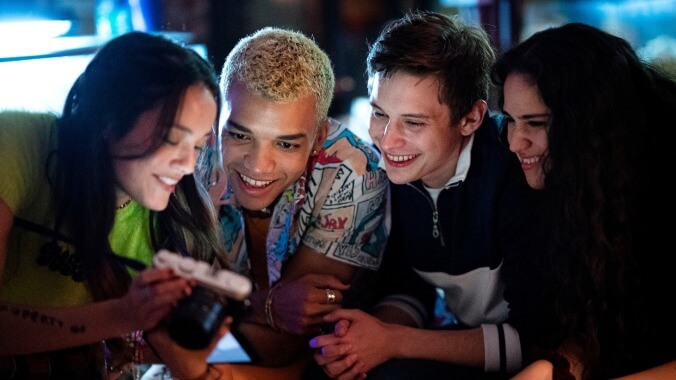HBO Max’s Genera+ion tells interesting but gimmicky coming-of-age stories

“I’m, like, a lot.” This is not only a line spoken by Justice Smith’s Genera+ion character within the first few minutes of episode one, it’s also a succinct review of the HBO Max drama trying to capture teen angst and desire for freedom. Produced by Lena Dunham, Genera+ion will inevitably be compared to HBO’s other recent offering in the genre, the Zendaya-led Euphoria. The two might tackle similar themes, but Genera+ion is not as heavy with despair. It’s still full of coming-of-age stories that deal with sexuality, familial relationships, and self-identity, but the storylines are presented with a more fun, self-aware energy—an energy that can be summed up with one word: extra. Genera+ion feels like it is doing too much, especially in the beginning. The premiere introduces different characters by showing bits of the same scene from their respective points of view, filling out some backstories in the process. These characters are meant to be relatable—and maybe they are, if only Gen Z is the target audience—but the dialogue writing tends to bog down the series.
Genera+ion swiftly invites viewers into its high school setting, starting with Smith’s extroverted Chester. His outfits (crop tops, nails painted with the words “pussy power”) are deemed offensive on multiple occasions, and land him in the office of the new guidance counselor, Sam (Nathan Stewart-Jarrett), who Chester immediately begins flirting with. The pilot also introduces the rest of his classmates, including photographer Riley (Chase Sui Wonders), closeted lesbian Greta (Haley Sanchez), activist-in-the-making Delilah (Lukita Maxwell), bratty twins Nathan (Uly Schlesinger) and Naomi (Chloe East), and an even brattier Arianna (Nathanya Alexander), who thinks it’s okay to make gay jokes because she has two dads.
The series’ relationships are all entangled, much like those in tons of other teen shows. What distinguishes Genera+tion is its very contemporary outlook into how these young adults handle their growing pains, using the technology, slang, and freedom of expression at their disposal. This doesn’t take shape right away, but as the season unfolds, the show slowly finds its footing. Which makes the accelerated release schedule—the first half of season one consists of three episodes at its debut, followed by five more episodes spread throughout March—a particularly smart move.
Genera+ion easily falls in line with not just Euphoria but other recent, voguish teen dramas, including On My Block and Élite, whose various episodes were tied together by some form of mystery. Genera+ion has that, too, as one of the girls (we don’t know who it is right away) unexpectedly goes into labor in a mall bathroom. The show is excessively theatrical early on (though maybe not to someone who is currently in high school). Chester spends his evenings doing casual “rooftopping” while Naomi abruptly stops to ask about a Sephora sale while in the middle of a crisis.
Most of these kids are part of the school’s LGBTQ+ population as members or allies, and even though they live in an apparently conservative community, they speak openly about their own ideas, perspectives, and fears. Once these teens start interacting with one another in a much more grounded manner, Genera+ion’s strengths emerge, as it dives meaningfully into serious issues meaningfully without getting too dark. Greta, whose mother was seemingly deported, attempts to shake off her wallflower personality and get closer to her crush. Chester gains some insight into his anxiety. Nathan starts to embrace his bisexuality, even if his mother, Megan (Martha Plimpton) finds it difficult to accept.
While it caters to a younger audience who might connect with the lingo and the carefree attitudes, the show expands on that bubble with a strong fourth episode. The story focuses on Megan, who is having a hard time with her son’s choices, how easy it is to be triggered, and society’s sudden need to put labels on everything and everyone. She relays as much to her friends Joe (J. August Richards) and Patrick (John Ross Bowie), Arianna’s parents, who offer their own insight into the matter. By spending time with the adults, Genera+ion tells the other side of the story—that of the older generation—showing that even grownups are all still just trying to figure out who they are and how to adapt to change.
Plimpton is a scene-stealer, but it’s Smith who really stands out among the younger cast members. He imbues Chester with warmth and conviction, making it easy to root for the character, especially as Sam helps him peel back his layers. Sanchez and Schlesinger are also increasingly impressive as their respective storylines come more into focus. As Naomi and Arianna, Chloe East and Nathanya Alexander deliver as the “mean girls” of the group. The show’s promising roster of talent includes 19-year-old Zelda Barnz, who helped create the show with her producing duo and fathers Daniel and Ben Barnz. The younger Barnz helps lend authenticity to the series, but Genera+ion tends to get lost in gimmicky storytelling devices. It already has the comedy, but it needs to dwell more on real, heartfelt character developments to really shine.